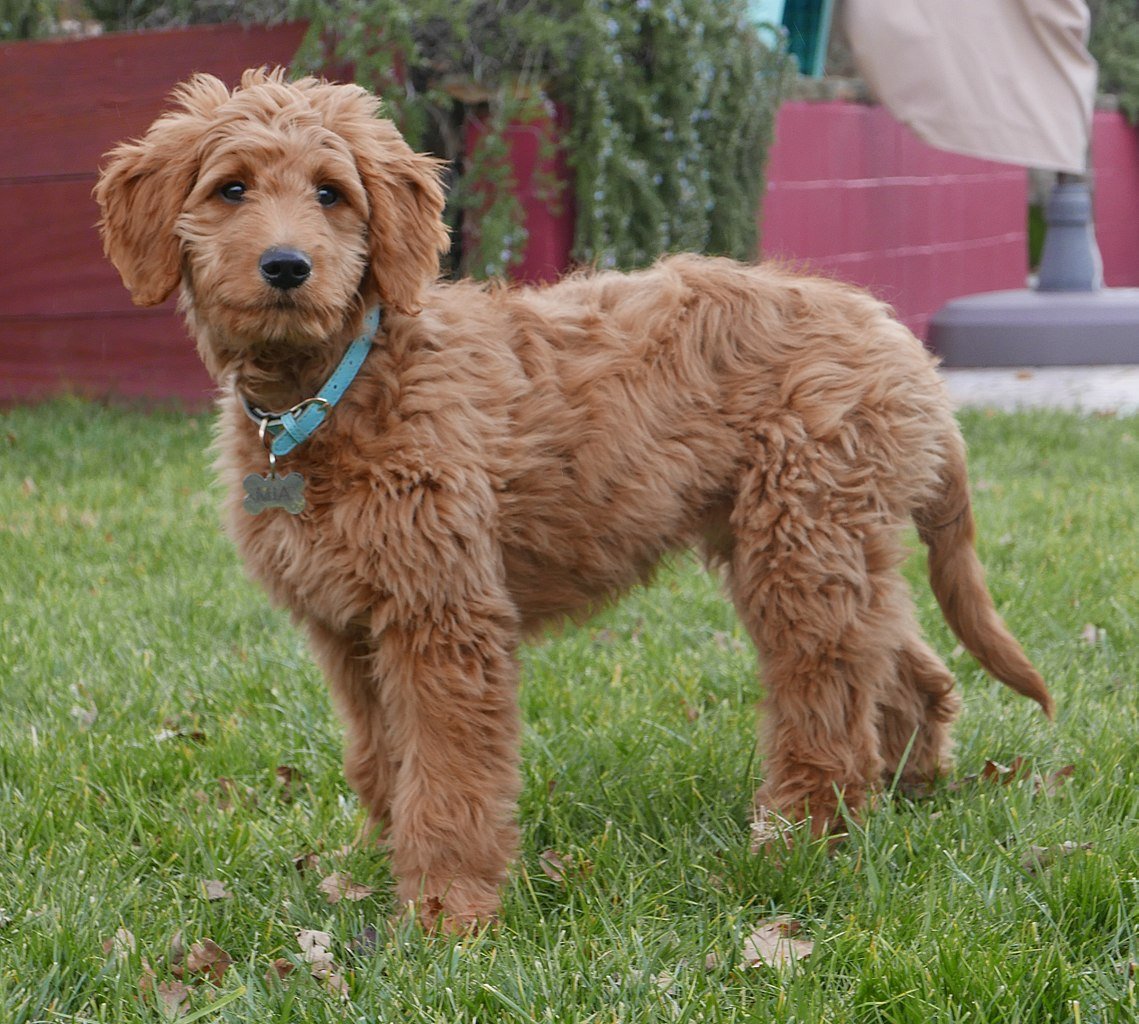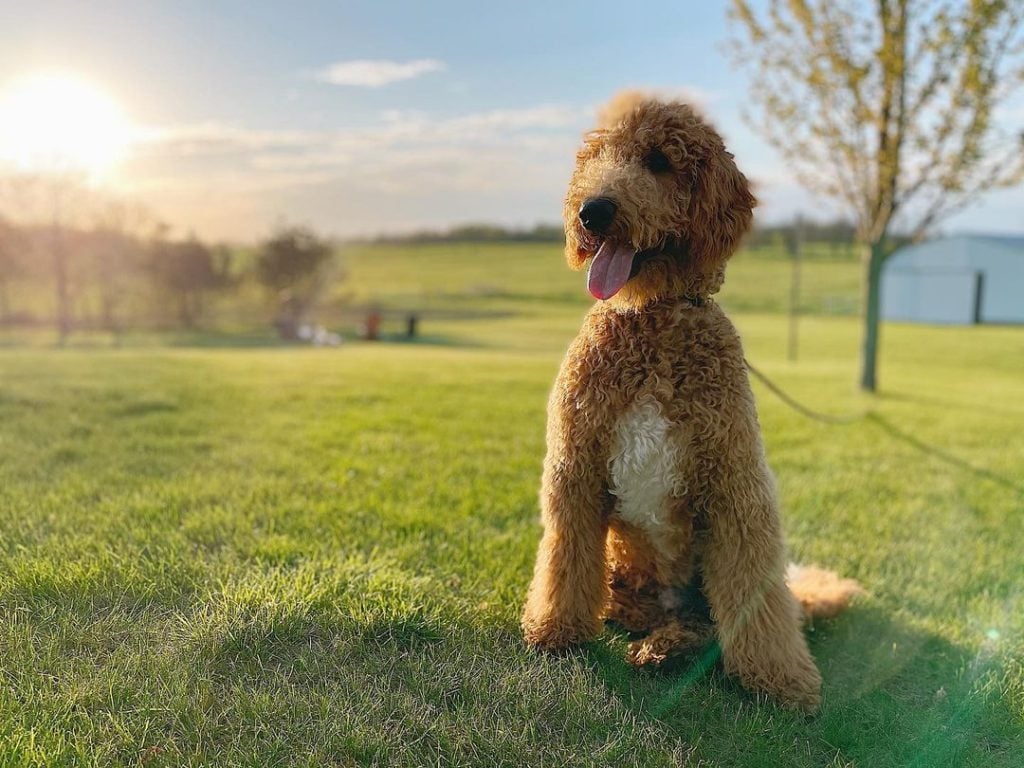
Part Golden Retriever, part Poodle, and all adorable…it’s the Goldendoodle! They are a hybrid breed beloved for their outgoing nature, friendly personality, and intelligence. They’re relatively new, gaining popularity since the 1990s alongside other crossbreeds like Cockapoos and Labradoodles. Back in the day, they were thought to be hypoallergenic. We now know that they may or may not be better for allergies depending on the dog and the person; but most do have soft, wavy fur that sheds less than other dogs.
Learn more about Goldendoodles—from their surprisingly recent origins to their family and guide dog potential—in this in-depth breed profile. We’ll help you decide whether this is the right kind of dog for you.
Breed Characteristics
Key
- Low
- Medium
- High
- Origin: United States
- Size:
- Weight: 23 to 45 kg
- Activity level:
- Barking/howling level:
- Good with dogs: yes
- Good with kids: yes
- Good with cats:
- Shedding:
- Shedding: Seasonal
- Grooming level:
- Training level:
Goldendoodle Appearance
When you hear the word Goldendoodle, you may picture an exact hybrid between a Golden Retriever and a Standard Poodle. In fact, they can vary quite a lot in appearance.
The size depends on the Poodle part of their heritage. Poodles come in miniature, medium, and standard sizes, and Goldendoodles do, too! That’s why you’ll meet some ranging from small (7 to 14 kg) to XL (up to 45 kg). As for their colouring, they don’t always have golden fur! In fact, they come in as many different colours as Poodles, ranging from light tan to apricot to chocolate to black.
Goldendoodles have shaggy, curly coats that are often described as being allergy-friendly or even hypoallergenic. However, the truth is that most allergies are caused by dander (dead skin cells shed alongside fur) more than the dog’s coat. Some people with more mild allergies may react less severely to these dogs because they shed less, but there’s no guarantee that a Goldendoodle will be hypoallergenic.

Goldendoodle Personality
One word describes the typical Goldendoodle personality: friendly! Goldendoodles are known for being happy, outgoing, and people-pleasing. Of course, dogs’ personalities vary a lot depending on genes and how much socialisation they get. But in general, Goldendoodles get along with everybody.
In fact, the Goldendoodle’s everyone-is-my-friend personality gives them a great reputation as a family dog. They’re happy, playful, and have the patience and stamina to run around with kids. As with any dog, proper socialisation and positive reinforcement training will help Goldendoodles and kids maintain friendly, safe interactions.
Ideal Environment for a Goldendoodle
Goldendoodles have moderate energy levels and live to be around their humans. That means that whether you live in an apartment or a house with a large garden, your Goldendoodle will thrive with daily exercise alongside the people they love. In other words, they’ll need some long walks!
Their retriever genes mean some love a game of fetch, so a fenced garden can be a huge help! But Goldendoodles can also live in apartments as long as they have access to outdoor activities like walks, runs, hikes, and swims (though not all love water).
As a social breed, they do best alongside their family and friends indoors. They need outdoor playtime, but shouldn’t stay outside all day. Give them a soft place to rest at home, and access to plenty of water throughout the day.

Ideal Human for a Goldendoodle
Here’s a not-so-well-kept secret about Goldendoodles: they love attention! So, the ideal owner will have lots to give, alongside a healthy dose of patience. It helps to have an active lifestyle, or to at least have the ability to help your dog get the exercise they need whether or not you can run alongside them (fetch and tug are great games to play with your pup)! These dogs are known for being pretty easygoing, but their attachment to humans can sometimes result in separation anxiety. The ideal owner will be prepared to help their dogs get used to a routine and offer them plenty of outlets for their happy energy.
Tips For Training Smart Dog Breeds
Because of their intelligence and people-pleasing manner, well-bred Goldendoodles excel in training. They love being around their people and will work hard alongside you, especially with lots of positive reinforcement. You’ll be amazed by what your Goldendoodle will do for a treat! If you get a Goldendoodle puppy, sign up for a puppy class with socialisation ASAP—the whole family will learn alongside the puppy, and they’ll get the socialisation they need to grow into amazing dogs.
Of course, adult doodles like training, too! Due to their intelligence and athleticism, Goldendoodles are also a lot of fun in dog sports. Once you have the basics of obedience down, you can explore agility, dock diving, and more with your doodle dog.
They are often trained as guide dogs alongside their Poodle and Golden Retriever relatives. Their brains, gentleness, and affectionate nature make them perfect for assistance dog roles. Learn more about guide dog training here.
Grooming a Goldendoodle
Grooming can depend on whether their coat is more like a Poodle’s or more like a Golden Retriever’s. If they have curly hair, they may need periodic trims from a professional groomer. If they have loose, wavy fur, regular brushing will help keep their coat shiny and remove shed hair.
As with any dog, Goldendoodles need their nails trimmed and teeth brushed. It’s also a good idea to check their ears periodically, as those long, floppy ears can be prone to infections.
Goldendoodle Health
Hybrid breeds are generally thought to be healthy in part due to their genetic diversity, which may or may not be true depending on the individual dog’s origins (for a more in-depth explanation, see this article from Vetstreet). These are considered a healthy breed, particularly when they come from an ethical breeder who is mindful of health.
Still, being knowledgeable about common health issues among Golden Retrievers and Poodles will help you monitor your Goldendoodle’s health throughout their life. Golden Retrievers and Poodles are both prone to hip dysplasia, so have your Goldendoodle’s hips checked at each veterinary appointment to be safe. Similarly, regular eye and ear exams will help ensure your doodle stays healthy. Some pet parents opt for pet health insurance, just in case.
History of This Newer Hybrid Breed
Goldendoodles are a relatively new breed. The first known intentional combination of a Poodle and Golden Retriever occurred in the late 1960’s. However, the Goldendoodle wasn’t considered a hybrid breed until the 1990’s when breeders began intentionally pairing Poodles and Golden Retrievers after seeing the success of the Labradoodle.
The name ‘Goldendoodle’, as you probably guessed, is a portmanteau combining ‘Golden Retriever’ and ‘Poodle’. It joins other doodle dog hybrid breeds like Labradoodles (Labrador Retriever and Poodle), Bernedoodles (Bernese Mountain Dog and Poodle), and Schnoodles (Schnauzers and Poodle).
In recent years, the original creator of the Labradoodle has expressed regret about sparking the crossbreed trend that led to Goldendoodles and other doodle dogs. The popularity of hybrid breeds led to some irresponsible breeding and unpredictable dogs. These days, it’s important to seek out a responsible breeder committed to managing traits across generations of dogs.
Getting a Goldendoodle
Finding a Goldendoodle puppy or adult dog can be as easy as an internet search, but be careful of puppy mills and internet scams. The best place to start is with animal shelters and breed-specific rescue groups, as Goldendoodles often become available from individuals rehoming dogs that they can no longer look after.
Cost of a Goldendoodle
Pet parents ready to welcome a Goldendoodle into their family should be aware of all the costs involved. In fact, according to Rover’s Cost of Pet Parenthood Survey, pet parents expect to spend £760 to £2,290 on upfront costs for their dog.
Goldendoodle Rescues
Most breed rescues report that a majority of homeless dogs come from individual owner surrender, with the most common reasons being a change in lifestyle or the breed not being right for the owner. So you may find a rescue Goldendoodle through a breed-specific rescue group or local animal shelter. While adults are more common in rescue, you may also find a puppy!
The good thing about rescue dogs is they often come with some basic obedience training and socialisation, and have detailed health and behaviour histories that help inform their care.
Goldendoodle Breeders
If it’s important to you to have a puppy, remember to do your research. Talk to breeders in person, and check their credentials and reputation before committing. It’s also important to meet the puppy’s parents and any offspring they’ve already had, if possible. Observing their personalities can help you determine if a puppy from that breeder would be right for you.
Knowing what you’re in for when you get a puppy is an important step in being a responsible pet owner. Whether you find a responsible breeder or are planning on adopting, prepare yourself for an energetic and friendly addition to your household.
Further Reading
Giddy for this breed? We’ve got you covered with plenty more golden goodness and info: